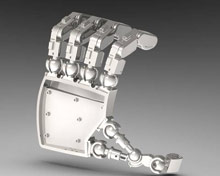
Photograph of the Robo-Prosthetic Development Platform courtesy of Dimension 3D.
A prosthetic-hand test platform designed by a community college student has won the university division of the sixth annual Extreme Redesign Dimension 3D Printing challenge, a competition in which high school and college students use computer-aided design (CAD) and a 3D printer to build ABS thermoplastic models. The Robo-Prosthetic Development Platform, designed by Dale Herzog of Quinsigamond Community College, Worcester, Massachusetts, is meant to allow researchers and students to test and develop software and hardware that can control the multiarticulating hand for either prosthetics or robotics purposes. Herzog will be awarded $2,500 for his design.
According to Dimension 3D’s website, the hand assembly is made of snap-together parts whose “smoothly sliding joints [are] capable of handling everyday objects” and whose “feathered” fingertips “allow a more distributed load on the object being grasped.” The hand is designed to accept custom circuit boards and sensors that can be integrated into each finger and to log more than 30 channels of data using the Arduino Mega microcontroller with eight Hall Effect sensors and five thermocouples. The finger assemblies and mounting points are standard and can be swapped out.
“Once mounted on the test stand via bolts in the wrist, the hand copies a classic flight control system, driven by a network of control lines, in this case monofilament thread passing through a reconfigurable control harness, Dimension 3D’s site noted. “Lastly, components representing the metacarpal bone of the thumb can be adjusted in length to vary the robots clenching ability to provide the robot with the widest array of possible use.”




